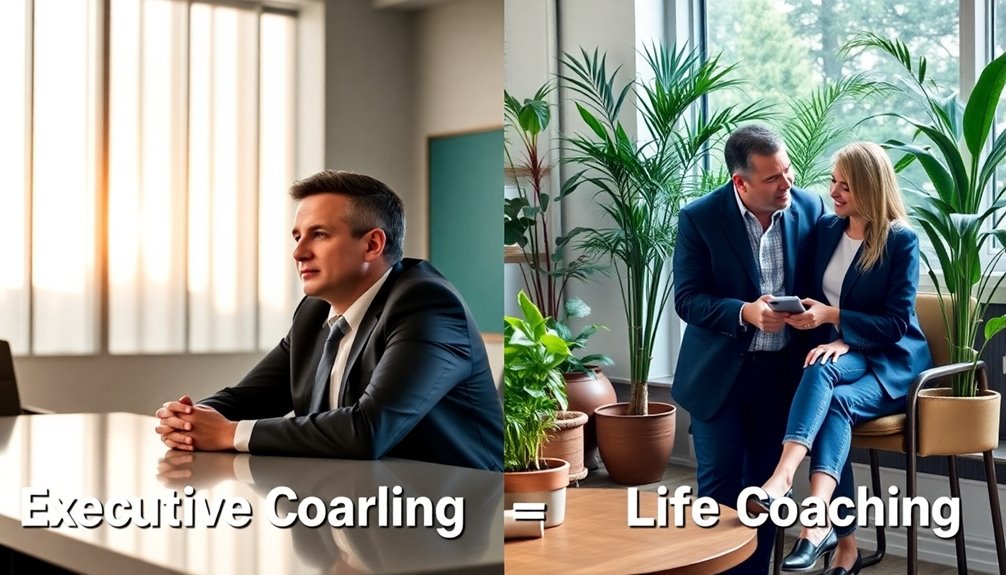When you're weighing executive coaching versus life coaching, you'll find key differences. Executive coaching targets business leaders and focuses on enhancing professional skills and performance. In contrast, life coaching is more about your personal development and overall life satisfaction, appealing to a wider audience. Training and certification also differ; executive coaches usually require advanced credentials, whereas life coaches have more flexible entry paths. Costs can vary significantly too. If you want to understand these distinctions better and see which coaching style fits your needs, you might find the following insights helpful.
Key Takeaways
- Executive coaching focuses on enhancing leadership skills and business performance, while life coaching emphasizes personal development and overall life satisfaction.
- Target clientele for executive coaching includes seasoned professionals, whereas life coaching caters to a broader audience seeking personal fulfillment.
- Executive coaching typically requires advanced degrees or extensive experience, while life coaching has more flexible training and certification requirements.
- Coaching costs vary significantly, with executive coaching ranging from $200 to $800 per hour, and life coaching averaging around $150 per session.
- Both coaching types employ structured models but differ in focus; executive coaching targets professional goals, while life coaching emphasizes personal growth.
Focus Areas of Coaching

Coaching comes in various forms, each tailored to specific focus areas that address unique needs. In executive coaching, you'll find emphasis on leadership development, where you'll enhance decision-making and build an adaptable culture. You'll also focus on achieving tangible business outcomes, like strategic planning and improved performance. Personal and professional growth is another key aspect, fostering resilience and self-awareness, while organizational impact highlights senior team development and innovation. With the industry's projected growth rate of 6.7% annually, coaching is becoming an increasingly vital component for organizations looking to succeed.
On the other hand, life coaching centers on personal development, enhancing life satisfaction, and setting personal goals. You'll work on health and wellness, improving your emotional and physical well-being. Relationships play a significant role too, as you learn to communicate better and navigate life transitions, ultimately helping you achieve balance and purpose.
Target Clientele Comparison

Understanding the focus areas of coaching sets the stage for comparing target clientele.
Executive coaching primarily targets business executives, leaders, and managers within corporate settings. These clients often seek guidance on leadership development, strategic planning, and improving business performance. They're usually at an advanced stage in their careers, ready to invest resources into achieving specific business objectives. This coaching often involves performance enhancement to help clients achieve their goals more effectively.
In contrast, life coaching appeals to a broad range of individuals from various backgrounds. Clients may be navigating personal challenges, seeking work-life balance, or pursuing self-awareness.
Unlike executive clients, life coaching clients can be at any stage of their journey, focusing on personal growth and fulfillment rather than strictly professional development.
Training and Certification Overview

Training and certification in executive and life coaching are vital components for anyone looking to excel in these fields.
Executive coaching programs typically require a graduate degree or significant professional experience and focus on leadership and organizational success. Their curriculum includes coaching fundamentals, specialized niches, and evidence-based education. Programs can last from a few months to over a year, often requiring mentor coaching hours. This rigorous training ensures coaches are equipped to address workplace burnout at both individual and organizational levels.
In contrast, life coaching training is more flexible, focusing on personal development without specific prerequisites. It emphasizes self-awareness and work-life balance.
While both paths offer certification, executive coaching programs often provide credits towards ICF credentials, enhancing your professional credibility and skills in the coaching arena.
Cost Differences Explained

When considering a coaching path, you'll notice significant cost differences between executive and life coaching.
Executive coaching typically ranges from $200 to $800 per hour, with an average rate of SGD $500 in Singapore. These costs often reflect the coach's experience, program duration, and the specific needs of senior leaders or C-suite executives, whose sessions tend to be pricier due to customization and privacy. Life coaching fees generally range between $75 and $5000 per session/month, making it a more accessible option for many individuals.
In contrast, life coaching generally costs between $75 and $200 per hour, averaging about $150 per session. Online sessions can be even cheaper, ranging from $50 to $100.
Factors like location, market competition, and the coach's qualifications also play crucial roles in determining these costs.
Coaching Techniques and Approaches

Coaching techniques and approaches vary significantly between executive and life coaching, each tailored to meet distinct client needs.
In executive coaching, frameworks like GROW and OSKAR focus on setting measurable business goals and evaluating performance, enhancing leadership capabilities. You'll engage in strategic planning, using tools like open-ended questions and active listening to explore solutions and assess progress. This approach is guided by the principle of establishing clear expectations, which helps in maintaining accountability throughout the coaching process.
Conversely, life coaching emphasizes personal development through models like FUEL and CLEAR, aiming for improved life satisfaction and alignment with personal values. Here, the coaching process fosters self-awareness and emotional well-being.
Both types employ structured models, yet they diverge in focus, ensuring you receive support that aligns with your professional or personal aspirations.
Measuring Impact and Outcomes

Understanding the effectiveness of coaching requires a thorough examination of the impact and outcomes associated with both executive and life coaching.
For executive coaching, you'll want to establish baseline metrics like leadership performance and team productivity before coaching starts. Regular progress reviews involving feedback from all stakeholders are essential, along with a mix of quantitative and qualitative data. This helps link coaching outcomes to specific business results. Additionally, improved employee engagement is a crucial benefit that can be measured through changes in team morale and productivity levels.
On the other hand, life coaching focuses on personal fulfillment and well-being. Here, you'll measure outcomes through surveys and self-reporting to evaluate improvements in life satisfaction and alignment with personal values.
Professional Development Vs Personal Growth

While both professional development and personal growth aim to enhance different aspects of your life, they focus on distinct areas of improvement.
Professional development targets enhancing your business performance and leadership capabilities, aiming for specific outcomes like strategic planning and improved decision-making. It helps you set SMART goals, accelerate your career, and reinforce essential skills. Additionally, coaching can improve productivity by an average of 86% when combined with training, highlighting its effectiveness in achieving professional goals.
In contrast, personal growth centers on your overall well-being and life satisfaction. It encourages self-awareness, emotional resilience, and achieving a work-life balance that aligns with your personal values.
While professional development emphasizes measurable business metrics, personal growth nurtures your emotional and physical health. Ultimately, both paths lead to fulfillment, but they cater to unique needs in your personal and professional journey.
Coaching for Executives Vs Individuals

When you consider the differences between executive coaching and life coaching, it's clear that each serves distinct purposes tailored to specific audiences.
Executive coaching hones in on enhancing leadership skills and improving business performance. It's designed for those in leadership roles, focusing on strategic thinking, decision-making, and emotional intelligence to drive organizational success. Research indicates that higher employee well-being is linked to executive coaching, further emphasizing its importance in fostering a healthy workplace environment. Additionally, effective leadership can significantly impact emotional support within teams, creating a more resilient work culture.
In contrast, life coaching emphasizes personal development, seeking to improve your overall life satisfaction and work-life balance. While executive coaching targets specific business outcomes, life coaching encourages self-awareness and alignment with personal values.
Ultimately, if you're looking to boost professional efficacy, executive coaching is your go-to, while life coaching is ideal for personal growth and emotional well-being.
Common Misconceptions About Coaching

Coaching, whether for executives or individuals, comes with a variety of misconceptions that can cloud its true purpose and effectiveness.
Many think coaches give direct advice, but they actually guide you in self-discovery through open-ended questions, helping you find your own answers.
Another myth is that coaching only addresses problems, when in reality, it fosters growth and taps into your potential beyond just fixing issues. Coaches also assist in identifying personal identity and values, which further enhances the coaching experience.
Some also believe coaching isn't a serious profession, but accredited coaches undergo rigorous training and adhere to ethical standards.
Finally, coaching isn't exclusive or overly expensive; it's accessible to everyone, with various pricing options available.
Coaching is a valuable investment in your personal and professional development.
Choosing the Right Coach for You

Finding the right coach can significantly impact your personal and professional growth, so it's essential to consider several key factors.
Start by evaluating their experience and track record—look for someone with proven success in helping clients at various leadership stages. Their coaching style should resonate with you; they should ask thought-provoking questions and adapt their methods to fit your learning style. Executive coaching often involves structured sessions focused on business scenarios, which can provide a clear framework for your development. Additionally, a coach who incorporates positive thinking techniques can further enhance your growth journey.
Compatibility and chemistry are crucial, as a strong rapport builds trust and encourages growth.
Lastly, check their specialization and credentials, ensuring they align with your specific needs—executive coaches should have leadership expertise, while life coaches benefit from some professional development.
Take the time to find a coach who inspires you and challenges you to achieve your goals.
Frequently Asked Questions
What Are the Ethical Considerations in Coaching Relationships?
In coaching relationships, ethical considerations are crucial. You need to establish clear boundaries and define the scope of your relationship with clients.
It's essential to maintain confidentiality and obtain informed consent before any interventions. Avoid dual relationships that could compromise your objectivity.
Make sure clients understand the coaching process, including limitations and financial aspects. By consistently reflecting on your ethical practices, you build trust and professionalism, ensuring a positive coaching experience for everyone involved.
How Do Coaching Sessions Typically Progress Over Time?
Coaching sessions typically progress through structured stages.
You start with building awareness, understanding your goals, and defining expectations.
Next, you analyze your strengths and weaknesses, creating an individual development plan.
During the action stage, you implement this plan, trying new behaviors and gathering feedback.
Finally, you assess your achievements, making necessary adjustments, and gradually taking on more responsibility.
This structured approach helps ensure you're on track to meet your personal and professional objectives.
Can Coaching Be Combined With Therapy or Counseling?
Yes, coaching can absolutely be combined with therapy or counseling.
This integration allows you to address both personal and professional aspects of your life, fostering holistic growth.
By working with both a coach and a therapist, you can set clear goals while also exploring deeper emotional issues.
Just ensure you communicate openly with both professionals about your objectives and maintain their collaboration for a more comprehensive support system tailored to your needs.
What Is the Role of Feedback in Coaching?
Feedback plays a crucial role in your coaching journey. It helps you identify performance gaps and recognize your strengths.
By receiving constructive feedback, you gain a fresh perspective, allowing you to reassess your plans and goals. This ongoing process fosters self-awareness, encouraging you to face challenges head-on.
Moreover, regular feedback tracks your progress, motivates you, and reinforces your commitment to continuous improvement in both your personal and professional development.
How Important Is Coach-Client Compatibility in Coaching Success?
Coach-client compatibility is essential for your coaching success.
When you and your coach share similar values and communication styles, it fosters trust and rapport, making it easier for you to engage in the process.
Through trial sessions, you can assess this fit and align your goals. A strong relationship enhances your motivation and accountability, ultimately leading to better outcomes.
Conclusion
In conclusion, whether you're seeking executive coaching or life coaching, understanding the differences can help you make the right choice. Each type of coaching targets unique areas of your life, from professional development to personal growth. By considering your goals and needs, you can find a coach who aligns with your aspirations. Don't hesitate to explore your options; the right guidance can make a significant impact on your journey toward success and fulfillment.









